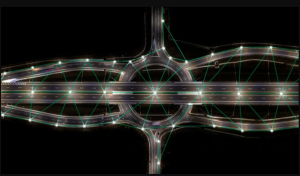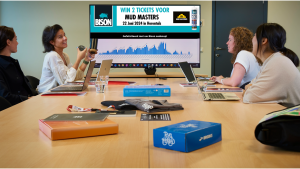Event logistics often seems to be a matter of ‘just delivering on time’. But the reality is more complex. 94% of professional event managers experience logistical problems during their events. From technical malfunctions to operational challenges – the figures speak for themselves.
Why does it go wrong so often? And more importantly, how can you prevent your next trade fair or event from becoming a logistical nightmare?
The Hard Reality of Event Logistics
38% of event organisers regularly encounter technical problems, while 68% see engagement management as their biggest operational challenge. These figures come from a survey of more than 500 professionals in the sector.
But it gets even worse at international events. Documentation errors cause 32% of all customs delays at cross-border events. A single mistake in your paperwork can mean that your stand materials arrive days late.
The biggest problem? 37% of event managers do not have adequate tools to measure logistical performance. Without insight into what is going wrong, you will keep repeating the same mistakes.
The Professional Planning Timeline: Why 8 Weeks Is Often Too Short
Many event managers think that eight weeks of preparation is plenty of time. Wrong. Professional standards require that logistical planning for large events begin 12-18 months in advance.
De Kritieke Mijlpalen
- Venue contracten en belangrijke partners vastleggen
- Internationale documentatie-eisen identificeren
- Budget en logistieke risico's in kaart brengen
- Hoofdleveranciers (catering, AV, transport) vastleggen
- Douane- en transportroutes definitief maken
- Noodscenario's ontwikkelen
- Laatste leveranciers (beveiliging, personeel, drukwerk) bevestigen
- Gedetailleerde tijdschema's per leverancier
- 48-72 uur bevestigingsprotocollen instellen
- Real-time coördinatie en probleemoplossing
- Direct contact met alle belangrijke leveranciers
International Aspects: Where It Gets Really Complex
Are you considering an international trade fair? Then event logistics becomes really interesting. ATA Carnets apply a 110% penalty scheme – if you forget even one step in the import/export process, you pay 110% of all import duties and taxes.
Critical documentation for EU events:
- EORI numbers for all importers
- Single Administrative Documents (SAD) for non-EU goods
- Entry Summary Declarations with strict deadlines
For US events:
- Automated Export System filing for shipments over $2,500
- Complete Harmonized System codes on all invoices
- Export control classifications for technical equipment
The problem: every border has different safety standards and procedures. What works in the Netherlands does not necessarily work in Germany or France.
Practical example: Thousands of items to Zandvoort
A good example of complex event logistics was our involvement in the F1 weekend at Zandvoort. A company wanted to deliver thousands of promotional items and stand materials exactly on time and – just as importantly – collect them again after the weekend.
The logistical challenge:
- Thousands of different items in different batches
- Strict timing due to Formula 1 security protocols
- Restricted access to the circuit grounds
- Everything had to be tidied up again after the weekend.
Our approach:
- All security requirements and access times mapped out in advance
- Phased delivery in smaller, manageable batches
- Dedicated project coordination throughout the weekend
- Pre-planning of collection logistics, including backup scenarios
The result: All materials delivered perfectly on time, no delays due to security checks, and everything neatly collected again after the weekend. The customer was able to focus entirely on creating a fantastic experience for their guests.
This case illustrates why early planning and experienced partners are essential for complex events.
Frequently Overlooked Logistical Elements
Our research shows that certain aspects are systematically overlooked:
Venue access details: Door sizes, loading platform protocols, lift capacity. Sounds basic, but often causes the most stress on the day itself.
Communication infrastructure: Backup systems that go beyond ‘we’ll call you.’ What if the network becomes overloaded?
Technology integration: testing Wi-Fi capacity under maximum load, power distribution, redundant connections.
Vendor coordination: Set up coordination between different suppliers. Who is permitted to enter when? Who has priority in the event of conflicts?
Plan iets met onze experts
Contact (klein)
Tools & Tips: What You Can Do Yourself
For event managers:
- Start logistics planning at least 6 months in advance (12+ for international events)
- Utilise professional event management software
- A 60%+ ROI is achievable with the right event management platforms.
- Invest in real-time tracking for all critical deliveries
When a logistics partner is required:
- International documentation and customs procedures
- Coordination of more than 5 different suppliers
- Events with strikte security or access protocols
- Just-in-time deliveries with zero tolerance for delays
- Complex setup sequences with dependencies
Technology Makes the Difference
Modern event logistics is increasingly driven by technology. 50% of meeting planners use AI for planning and execution, while 89% of companies save more than 200 hours per year through event technology.
But technology is only effective with the right expertise behind it. That is why more and more professionals are choosing specialised logistics partners who have both the technology and the experience.
From Chaos to Control
Successful event logistics begins with recognising that this is a profession in its own right. 95% on-time performance and 99%+ order accuracy are no coincidence – they are the results of professional planning and execution.
Whether you are organising a local trade fair or an international product launch, the principles remain the same: start early, plan thoroughly, and work with partners who know the difference between ‘just delivering’ and ‘perfectly organised’.
Because in the world of events, timing is everything. And timing starts with the right logistical planning.
Do you have questions about the logistical planning of your next event? Please contact us using the contact form below and let our specialists help you determine the best approach.
Sources
- 94% of logistical issues:
Centre for Exhibition Industry Research (CEIR), 2025 - 38% technical issues, 68% engagement challenges:
Sweap Event statistical research, 2025
(survey of over 500 professionals) - 32% customs delays:
DHL Express International Shipping Studies, 2024 - 37% measure problems: Cvent Event Statistics Industry Report, 2025
- 12-18 month professional planning calendar:
Professional Convention Management Association (PCMA) Professional Standards
&
International Association of Exhibitions and Events (IAEE) CEM Guidelines - ATA Carnet 110% penalty scheme:
Official documentation from US Customs and Border Protection, 2025 - 50% AI adoption, 89% time savings:
Mordor Intelligence Event Management Software Market Report, 2025 - Event management software with a return on investment of over 60%:
Studies on the return on investment of professional event management Cvent, 2024


